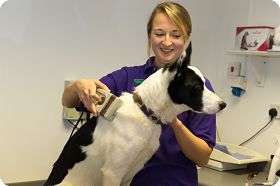Since the 1st April 2016 it is law in the UK for all dogs to be microchipped and for their owners to keep their contact details up to date.
Having your pet microchipped will give you peace of mind that should your pet go missing, you have a higher chance of being reunited.
What is a microchip?
A microchip is a tiny computer chip housed in a type of glass made to be compatible with living tissue. It is the size of a grain of rice. Each one carries a unique 15 digit code. It is perfectly safe and offers a reliable and permanent method of identifying your pet.
Vets, dog wardens, the police and rescue organisations have scanners which will read the microchip. Your contact details are recorded and stored on the National database, Petlog. The database is accessible 24 hours a day, 365 days a year, so that if necessary, you can be reunited with your pet as soon as possible.
Having your pet microchipped
A microchip can be placed at any age from 6 weeks and is suitable for dogs, cats, and rabbits. Birds and even reptiles can be microchipped but the procedure is a little more involved. Please telephone for individual advice on these species.
We offer this service during a routine consultation with a vet or nurse. The tiny microchip is quickly implanted into the animal’s scruff (the loose skin at the back of the neck) between the shoulder blades in most pets. A few animals may feel a slight discomfort during the procedure. Once the microchip is implanted, it is encapsulated by the body tissue which prevents it from moving around.

Benefits of Microchipping
What happens when a microchipped animal is found?
How much does a microchip cost?
Implanting a microchip and registration with Petlog is £20
This service is FREE to Healthy Pet Club members.
How do I update my contact details?
If you move house, change telephone numbers or rehome your pet, you will need to contact Petlog. Details can be found on your Microchip Registration Document or online at www.petlog.org.uk
Petlog also offer a service that enables you to temporarily change your contact details at any time. This is particularly useful if you take your pet on holiday with you.
©2024 Shepton Veterinary Group Ltd., All rights reserved.
Privacy Policy • Terms & Conditions • Cookie Policy